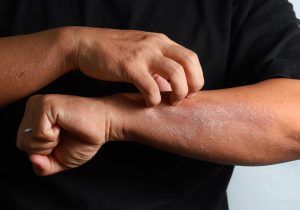
Understanding eczema
Having a rash can be very irritating, especially if you’re itching to know the reason for the redness. A rash can take many forms and occur for many reasons. If you notice that your skin has become flaky, itchy, patchy, red, or painful, it may be a case of eczema. Eczema is not a single skin condition, rather, it refers to a group of conditions that can leave your skin scratchy, sore, and scaly. However, before you get scared about eczema, get informed about its causes and the prevalence of the problem, along with whether you’re at risk and the signs that may be written all over your face and body. Then, uncover the treatments to clear up, not only your skin, but also any confusion or fear you may have about eczema.
Scratch beneath the surface of eczema
Eczema is much more than just a rash. It’s actually a group of skin conditions that causes red, rough, sore, blistered, patchy, or scratchy skin. When you’re experiencing symptoms or side effects, it’s described as a flare-up. When the symptoms clear up, it’s called a remission. There are several kinds of eczema based on the factors that cause a flare-up and the sort of rash that results. The most common type is known as atopic dermatitis, which is the type usually referred to as eczema. No matter what you call it, this inflammatory skin condition can appear on anyone at any age. It typically begins in childhood and can even be seen in babies, but may flare up in adolescence, or develop in adults either early or later in life. Eczema is a chronic condition, so it may last for a long time. Many children find that it disappears completely by adolescence, but some people face flare-ups throughout their lives.
A rapidly spreading condition
Eczema can make you feel very self-conscious about your appearance, especially if you think that the rest of the world is living with soft, silky-smooth skin. The truth is that more than 31 million people in the United States alone are affected by some sort of eczema, which is close to 10% of all Americans.
The risk for the rash
While the cause of eczema is unknown, there are several known factors that make you susceptible to suffering from eczema. The following risk factors can affect the intensity, severity, and frequency of a flare-up:
- An overactive immune system
- A family history of eczema
- Allergies like hay fever and asthma
- Stress
- Dry skin
- Living in places with extreme temperatures
- Environmental pollutants
- Chemical detergents and disinfectants
- Skin irritants like soap, shampoo, and skincare products
A rash of eczema symptoms
The signs of eczema may look and feel different on each person, but they’re impossible to ignore. You may see them as rashes or darkness on your face and body, most commonly on your hands, knees, feet, neck, elbows, ears, and within the folds of your skin. You may feel it as sore, painful, itchy skin that begs to be scratched, but don’t! Scratching may offer a moment of relief, but it can make the condition worse and increase your risk of skin damage and infections. For most people, eczema symptoms are mild, but they can come and go over time and vary in severity. The most common symptoms of an eczema flare-up include:
- Itchiness
- Red, inflamed skin
- Scaly patches
- Dry, cracked skin
- Small, raised bumps
- Oozing or crusty skin
- Soreness
- Pain
- Swelling
Aiming for remission with treatment
Eczema isn’t something contagious you can “catch” or a disease that you can cure, but it’s a condition you can manage, and most cases clear up in time. However, keep in mind that eczema can worsen if left untreated, so it’s vital to seek treatment at the first sign of symptoms. Your CarolinaMD-affiliated doctor can help develop a treatment plan based on the type of eczema, the severity of your symptoms, your age, and your personal preferences. Treatment may include:
- Applying moisturizing creams to help repair the skin.
- Using topical medications to help relieve itchiness and inflammation.
- Taking prescription medications.
- Using phototherapy, which provides exposure to UV waves to improve the skin’s appearance.
- Trying home remedies, such as taking lukewarm baths, using mild cleansers, and moisturizing every day.
- Avoiding eczema triggers.
Hopefully, these insights will soothe your skin and scratch your itch in understanding eczema so you can take care of the skin you’re in.
Sources:
- https://nationaleczema.org/eczema/
- https://www.aad.org/public/diseases/eczema/types/atopic-dermatitis
- https://www.medicalnewstoday.com/articles/14417
About CarolinaMD
CarolinaMD is one of the nation’s largest firms providing initial conversion and ongoing support services to concierge medicine physicians. CarolinaMD currently partners with over 200 affiliated primary care physicians and specialists across 35 states, and its network is rapidly expanding.